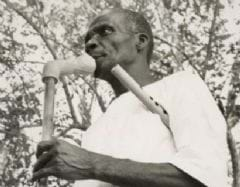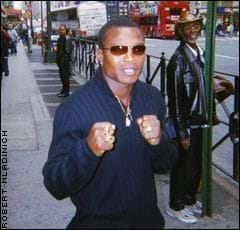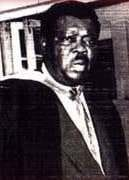In the village of Peki-Avetile alias Peki Abenase, in the Volta Region of Ghana, was born on 13th September, 1899, Dr. Ephraim Amu, the last of eight children who was educated at Peki Avetile and later at Basel Missionary Seminary at Abetifi where he trained as a teacher-catechist between 1916-1919, for a period of four years. In 1937 he went to London where he studied music theory at the Royal College of Music. His first exposure of music was from his father who was a traditional drummer singer and carver. In 1921, he met a musician and Minister called Rev. Allotey Pappoe at Peki Blengo from whom he studied some theory and harmony. This marked the beginning of the composition-career of Ephraim Amu. His early compositions, Mawo do na Yesu (I shall work for Jesus), Hadzidzi amefe gbogbo (Singing, the soul of man) and Yehowa enyesitsofe (The Lord is my refuge) has strong European melodic and harmonic musical characteristics.
At Akropong when he was asked to transcribe and teach the traditional song, "Yaa Amponsa", he came face to face with the reality of the inadequacy of the Western notation. This set him on the trial of researching into African music, and writing in that idiom. The result of this period of musical activities crystalised in such songs as Onipa, da wo so, Yen ara asase ni and Yaanom Abibirimma among others. Simultaneously his researches yielded good knowledge about the atenteben and odurugya flutes whose music he taught to his students. These he did with encouragement of Rev. Thomas Beveridge the then Principal of Presbyterian Training College at Akropong.
Amu, the staunch Africanist, was not only so musical but he was also a living personification of Africanism. His life style, thoughts and outlook emphasized the capabilities and beauty in the Culture and Church was propagating. A practical expression of his love for African culture was the composition of Ame wo dzife nyiba, translated into "Yen ara asase ni", an alternative to God save the queen, and Land of our birth which used to be sung at the colonial Empire Day celebrations.
The strain between Amu and the Church authorities on his Africanist tendencies resulted finally in his dismissal from Akropong in 1933. At his farewell ceremony the students sang his composition, Nkradi - Abosomakotre nam brebre. Immediately after his dismissal he was invited to teach music at Achimota School and Training College by Rev. A.G. Fraser, Principal of the School/College. In Achimota he taught Music, Scriptures and Agriculture.
In 1937, he studied Music at the Royal College of Music in London and returned to Achimota College in 1941. In 1949 he established and directed what is now the National Academy of Music, then known simply as School of Music at Achimota. This school as well as the College was transferred from Achimota to form the nucleus of the Kumasi College of Arts, Science and Technology in 1952. Here he taught single handed. Occasionally he had one or two of his past students to assist him, till he retired in 1961, after the School had been transferred again to Winneba.
As a result of a memorandum he submitted to Dr. Nkrumah, the then Prime Minister of Ghana on invitation, another Music School was established as part of the Institute of African Studies at the University of Ghana, under the directorship of Professor Nketia. Dr. Amu was once more recalled from retirement and attached to the School as a Research Fellow. In 1966, the University of Ghana conferred on him the Honorary Doctorate degree.
The most outstanding and monumental work was the publication of the introduction of his Twenty five African songs. That work can be considered the first musicological study of African Music over made by an African. In that study Ephraim Amu discusses the theoretical basis of African rhythm - the corner-stone of African Music.
The first phase of Amu's musical life can be dated from his early days to 1937 when he left for London. This body of songs, are characterised by a homophonic style while emphasizing African rhythmic texture. The melody of the music tries to follow the inflection of the spoken words. Yet the block chord nature of the harmony makes them sound like Western hymn style, typical of the contents of the Twenty five African songs.
The second phase of his musical life dates from 1941 when he returned from London. He had been exposed to the technique of contrapuntal writing. And he saw in the technique the African musical element of independent multiple part singing and the complexity of African drum ensembles. Almost without exception all the compositions of this era are contrapuntal in texture, a technique, he explains, that more adequately enables the component voice parts to sing melodies that are based on the tone-tune relationship.
This phenomenon is apparent in both vocal and instrumental pieces as well as for Atenteben and/or Odurugya flute music. These include pieces such as Adawura abo me, Samansuo, Ale-gbegbe or pipe tune No.1.
Ephraim Amu died in 1995.
Source:
Please rate this
Poor




 Excellent
Excellent




 Excellent
Excellent
Votes: 0 |NaN out of 5








